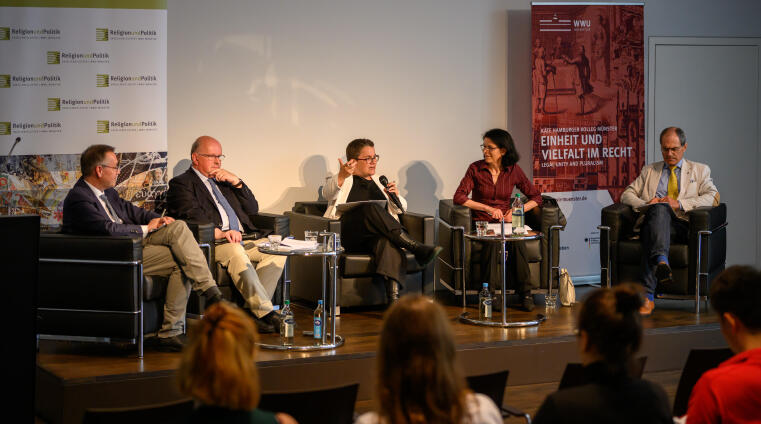
Discussion evening “How stable is peace?”
The Peace of Westphalia as a treaty under international law
How stable is peace? How can it be maintained after years of war? The anniversary year saw researchers discuss the long-term consequences of the Peace of Westphalia 375 years ago, and what the past events can teach us today. Entitled “How stable is peace? The Peace of Westphalia as a treaty under international law”, the discussion evening focused on how an agreement was reached after 30 years of war that brought peace to Europe and a new, forward-looking system of international law.
“What many people probably asked themselves after the peace treaty 375 years ago is still an issue today in the face of war in Europe: how can we not only make peace, but also maintain it?” said early modern historian Ulrike Ludwig, director of the Käte Hamburger Kolleg “Legal Unity and Pluralism” (EViR) at the University of Münster, which organized the evening together with the Cluster of Excellence.
“In view of seemingly insoluble conflicts today, the question arises as to how a compromise could be reached back then, when the sides were similarly entrenched, and what we might learn from looking at this historical example”, explained Ludwig. The discussion evening looked at the long-term effects of the peace treaty 375 years ago from a historical, legal and constitutional perspective.

The panellists were historian Prof. Dr. Claire Gantet (Fribourg), legal scholar Prof. Dr. Christian Hillgruber (Bonn), historian Prof. Dr. Christoph Kampmann (Marburg), and legal historian Prof. Dr. Peter Oestmann, EViR director and researcher at the Cluster of Excellence. “We are exploring how an agreement was reached after 30 years of war that brought peace to Europe and a new, forward-looking system of international law”, said EViR director Ulrike Ludwig, who moderated the evening.

